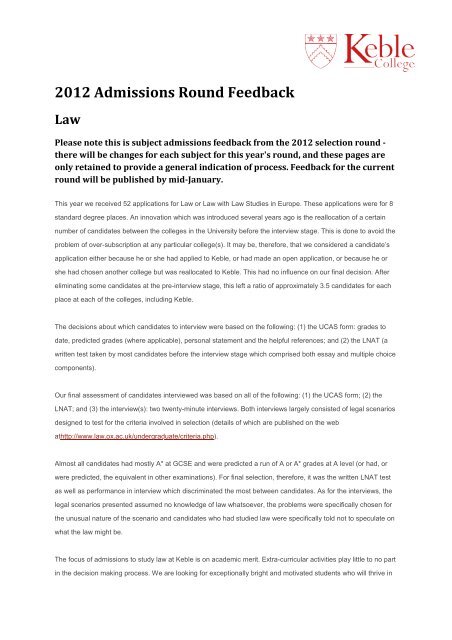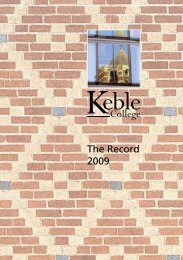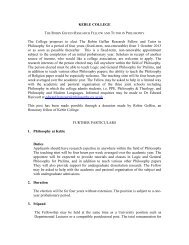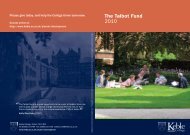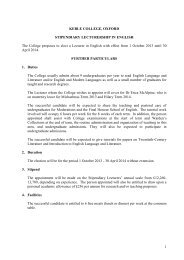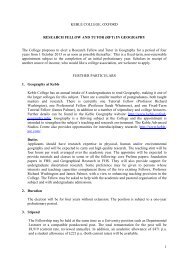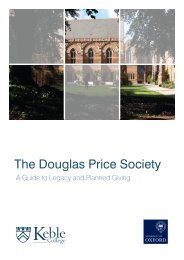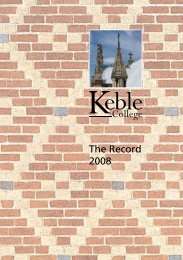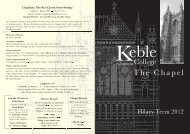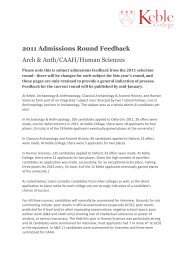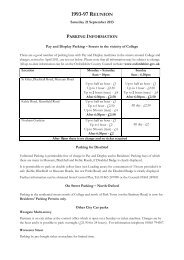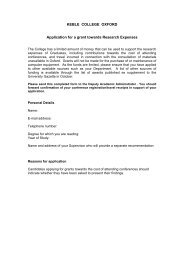Feedback 2012 - Keble College
Feedback 2012 - Keble College
Feedback 2012 - Keble College
You also want an ePaper? Increase the reach of your titles
YUMPU automatically turns print PDFs into web optimized ePapers that Google loves.
<strong>2012</strong> Admissions Round <strong>Feedback</strong><br />
Law<br />
Please note this is subject admissions feedback from the <strong>2012</strong> selection round -<br />
there will be changes for each subject for this year's round, and these pages are<br />
only retained to provide a general indication of process. <strong>Feedback</strong> for the current<br />
round will be published by mid-January.<br />
This year we received 52 applications for Law or Law with Law Studies in Europe. These applications were for 8<br />
standard degree places. An innovation which was introduced several years ago is the reallocation of a certain<br />
number of candidates between the colleges in the University before the interview stage. This is done to avoid the<br />
problem of over-subscription at any particular college(s). It may be, therefore, that we considered a candidate’s<br />
application either because he or she had applied to <strong>Keble</strong>, or had made an open application, or because he or<br />
she had chosen another college but was reallocated to <strong>Keble</strong>. This had no influence on our final decision. After<br />
eliminating some candidates at the pre-interview stage, this left a ratio of approximately 3.5 candidates for each<br />
place at each of the colleges, including <strong>Keble</strong>.<br />
The decisions about which candidates to interview were based on the following: (1) the UCAS form: grades to<br />
date, predicted grades (where applicable), personal statement and the helpful references; and (2) the LNAT (a<br />
written test taken by most candidates before the interview stage which comprised both essay and multiple choice<br />
components).<br />
Our final assessment of candidates interviewed was based on all of the following: (1) the UCAS form; (2) the<br />
LNAT; and (3) the interview(s): two twenty-minute interviews. Both interviews largely consisted of legal scenarios<br />
designed to test for the criteria involved in selection (details of which are published on the web<br />
athttp://www.law.ox.ac.uk/undergraduate/criteria.php).<br />
Almost all candidates had mostly A* at GCSE and were predicted a run of A or A* grades at A level (or had, or<br />
were predicted, the equivalent in other examinations). For final selection, therefore, it was the written LNAT test<br />
as well as performance in interview which discriminated the most between candidates. As for the interviews, the<br />
legal scenarios presented assumed no knowledge of law whatsoever, the problems were specifically chosen for<br />
the unusual nature of the scenario and candidates who had studied law were specifically told not to speculate on<br />
what the law might be.<br />
The focus of admissions to study law at <strong>Keble</strong> is on academic merit. Extra-curricular activities play little to no part<br />
in the decision making process. We are looking for exceptionally bright and motivated students who will thrive in
the intellectually charged atmosphere of law at <strong>Keble</strong>. <strong>Keble</strong>’s law teaching team involves one full-time tutorial<br />
Fellow: Professor Edwin Peel (who researches and teaches Contract, Torts, International Trade, and, on<br />
graduate courses, the Conflict of Laws and Commercial Remedies) and several college Lecturers: Asif Hameed<br />
(who teaches EU, Constitutional Law and Jurisprudence); Tatian Cutts (Trusts), and Hannah Glover (Roman<br />
Law). <strong>Keble</strong> Law also has a Fellow by Special Election, Professor Jonathan Zittrain, who is one of the world’s<br />
leaders on cyber-law and Professor Viktor Mayer Schoenberger, Professor of Internet Law and Regulation.<br />
Amongst this large group of law tutors, <strong>Keble</strong> also regularly hosts distinguished visitors who speak and engage<br />
with the students, including judges, barristers and solicitors and those whose experiences with the law will<br />
educate and stimulate.


